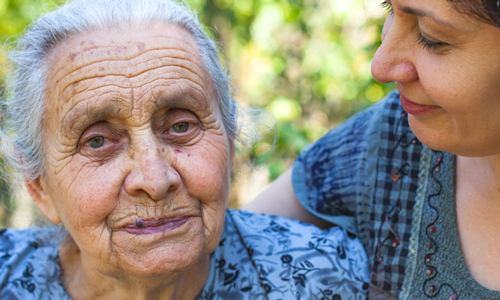
Covid highlighted a need for community

It is generally recognised that whether you feel part of your community has a big impact on your quality of life, and this becomes even more important as you get older. Being active in the community, through meeting with a group that shares common interests or through being able to get out and about, can significantly impact someone’s sense of wellbeing. Fundamental to this is whether your home is suited to your needs and therefore enables you to live as well and independently as possible.
Unfortunately, one of the main impacts of the coronavirus pandemic was the need for everyone to stay at home and to keep away from others. While everyone was affected by the lockdown, there were many older people who then faced difficulty with accessing food and essentials safely. Community groups often stepped in to ensure that older people in their area were being helped where it was needed. As the pandemic progressed, community groups adapted to support their members in new ways and to make sure no one was left without any support.
Our research highlighted just how important community was to people during the height of the lockdown months as 94,000 older people said that they wouldn’t have got through the last year without the kindness of strangers. That means on every street in Scotland, there is an older person whose life has been made immeasurable better thanks to the community spirit and action undertaken over the last year.
The enforced time spent at home also meant that a lot of people were confined to spaces that did not support their wellbeing, for example through not having access to outdoor space or staying in homes that are costly to keep warm.
Age Scotland has long advocated for more age friendly design to housing and communities, which would mean taking into account the accessibility needs of older and disabled people when designing new homes or building new developments. Communities and homes should be designed so that everybody can use them fully and this also means reassessing town centre use, street design and many other public areas so that everyone can benefit from these spaces.
Case Studies
During the pandemic, in November and December 2020, Age Scotland conducted research on older people’s housing preferences using small focus groups online and through telephone interviews with older people. The below comments are from The Housing Needs of Older People – Panel Report, by Age Scotland. These comments offer a few snapshots of how older people felt about their housing and the importance of community during the pandemic:
- ‘I had to shield between March and September and if things continue rising here (Covid cases) then will need to do so again. With osteoarthritis in both knees and as I live on first floor it is painful getting out and about. However, thankfully Sainsbury’s have been keeping me fully supplied with food and essentials.’ (Rural participant)
- ‘I wasn’t shielding and I felt exceptionally grateful for having a safe place to be with a garden etc. For some people it was truly a miserable time.’ (Other urban participant)
- I am fortunate in that I am still very active but that allows me to assist others who are less active to be part of our group and so part of the community. Even now, in lockdown, we keep in touch with one another making sure the more vulnerable among us are coping/being cared for.’ (Rural participant)
- ‘I had great help from the community during lockdown. Emails and calls to check that I was OK as I live alone. They picked up prescriptions of my gluten free food and I got gifts of fruit and veg from the local community group. Grey Matters delivered cooking kits and craft kits to keep us busy and set up zoom chat meetings every week.’ (Small town participant)
- ‘Accessible housing would be hugely beneficial but people who need accessible housing also need easy access to services and amenities. A lot of new house building is on the edge of towns so may not be ideal.’ (Other urban participant)
Age Scotland's Response
Age Scotland’s helpline took an enormous volume of calls at the start of the coronavirus pandemic, as older people turned to us with a wide range of queries and concerns. In March and April 2020, we received ten times more calls than the normal volume.
From the start of the pandemic, one of the most common and pressing concerns that Age Scotland received calls about was older people struggling to buy food or get shopping delivered to their homes. With many older people shielding, their normal way of shopping was no longer an option for them, and food delivery slots were very hard to come by. This left a lot of people with no real way of getting any food and in distressing circumstances.
Age Scotland was aware of how desperate this situation had become for some people due to the calls we were receiving to our helpline. Our advisors were directing people to local sources of support and to the national shielding helpline. During this time, Age Scotland surveyed its members and supporters and found that found 32% of respondents struggled to get food from a supermarket and 39% faced difficulties getting an online delivery.
In June 2020, Age Scotland along with other leading charities wrote a letter to the First Minister on the many difficulties that people were having with access to food. While most supermarkets were introducing new measures to try and get food deliveries to older or vulnerable customers, the systems were not accessible enough to ensure that everyone was able to get the delivery slots they needed. Over 500,000 over 60s in Scotland do not use the internet and so booking online delivery slots was not an option for them. In addition to this, not every supermarket has a phone number available for people to order their groceries over the phone.
Age Scotland also used the calls to its helpline to feedback to the Scottish Government on key issues that we were hearing about from older people. During the first 6 months of the pandemic, over 700 calls were made to our helpline to ask about housing related concerns. The most common concerns were about needing to make repairs to the home, in particular boiler repairs, and how to organise this during the pandemic. A key aspect of this was also how to afford the repairs and whether there was any support available to do this. Other common queries were about how to apply for social or sheltered housing, and how to afford adaptations to the home.
We analysed these calls and reported these concerns to the Scottish Government to demonstrate the types of issues that older people were facing during the pandemic that were related to their housing. One of the many ways that Age Scotland supports older people is to report their concerns to the Scottish Government, to influence policy and to advocate for changes that older people tell us they need.
The Age Scotland helpline is available 9am – 5pm, Monday to Friday for people aged over 50 in Scotland. The anonymised data gathered by our helpline during these calls is reported internally to help us review the policy work that we do and to inform us of issues that we should raise with the Scottish Government.
Our Recommendations
The impact of the coronavirus pandemic and the lockdowns should be used to help inform Scottish Government work. The importance of community groups, being able to participate in community activities and having a home that suits your needs have been brought to the forefront of everyone’s attention more than ever before. The Scottish Government should consult with older people and community groups as they plan how society should be opened up.
Funding should be made available to ensure that community groups and community venues can afford to reopen when lockdown is over. It is undeniable that these groups and spaces have been a lifeline to people during this time and their value going forward should not be forgotten. As society is eventually able to open up again, community groups will be an important part of how people build their social lives again.
It should be possible to learn from this pandemic and to recognise the many barriers that older and disabled people face when accessing services. The lockdowns and the need for vulnerable people to shield created new barriers, but it also brought long-standing ones into sharp relief. Services should have telephone numbers that people can call for help that are staffed and that don’t use a long menu of options before you have the option to speak to somebody. We can’t rely on digital by default services as it cuts off far too many people.
Age Scotland’s report ‘Housing Needs of Older People – Panel Report’ finds that a much greater number of accessible houses are needed in Scotland. The Scottish Government and Local Authorities should look at targets for accessible houses to be built in every community and there should be greater funding for adaptations to be made to people’s homes. Enabling older people to live well at home will increase their ability to live independently and to engage with their community around them.
The Age Scotland Helpline
Our free 0800 12 44 222 helpline is a free, confidential phone service for older people, their carers and families in Scotland. Lines are open Monday to Friday 9am - 5pm.
